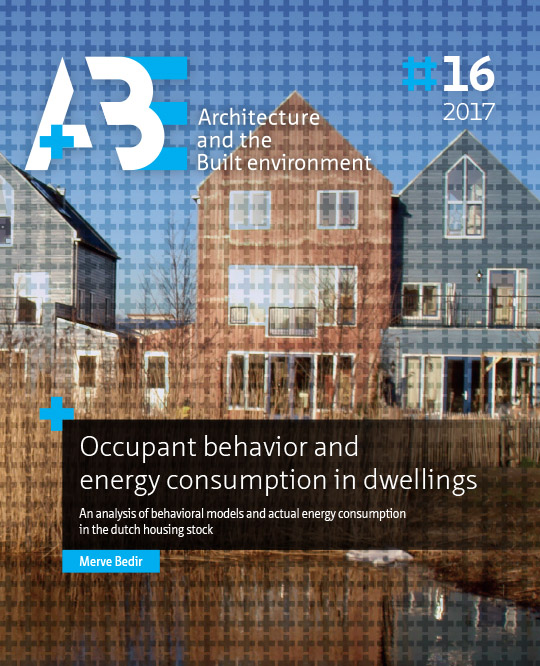
Much is known about the increasing levels of energy consumption and environmental decay caused by the built environment. Also, more and more attention is shown to the energy consumption of dwellings, from the early design stage until the occupants start living in them. The increasing complexity of building technologies, the occupants’ preferences, and their needs and demands make it difficult to achieve the aimed energy consumption levels. The goal of reducing the energy consumption of dwellings and understanding the share of occupant behavior in it form the context of this research.
Several studies have demonstrated the ‘energy performance gap’ between the calculated and the actual energy consumption levels of buildings, and have explored the reasons for it. The energy performance gap is either caused by calculation drawbacks, uncertainties of modeling weather conditions, construction defects regarding air tightness and insulation levels, or by occupant behavior. This research focuses on the last aspect, i.e. analyzing the relationship between occupant behavior and energy consumption in dwellings, understanding the determinants of energy consumption, and finding occupants’ behavioral patterns.
There are several dimensions of occupant behavior and energy consumption of dwellings: dwelling characteristics including the energy and indoor comfort management systems, building envelope, lighting and appliances; occupant characteristics including the social, educational and economical; and actual behavior, including the control of heating, ventilation and lighting of spaces, and appliance use, hot water use, washing, bathing, and cleaning. Attempting to understand this complexity asks for a methodology that covers both quantitative and qualitative methods; and both cross-sectional and longitudinal data collection, working interdisciplinary among the domains of design for sustainability, environmental psychology, and building and design informatics.
The main question that this thesis deals with is: How much does the occupant behavior influence the energy consumption of dwellings in the Netherlands, and how could we identify the determinants of consumption, as well as the behavioral patterns and profiles?
Er is veel bekend over de toenemende niveaus van energieverbruik en milieuverval die door de gebouwde omgeving worden veroorzaakt. Ook wordt steeds meer aandacht besteed aan het energieverbruik van woningen, vanaf het vroege ontwerpstadium tot het moment dat de bewoners erin gaan wonen. De toenemende complexiteit van de bouwtechnologieën, de voorkeuren van de bewoners en hun behoeften en eisen maken het moeilijk om de beoogde niveaus van energieverbruik te bereiken. De doelstelling om het energieverbruik van woningen te verminderen en het aandeel van het gedrag van de bewoners daarin te begrijpen, vormen de context van dit onderzoek.
Verschillende studies hebben de “energieprestatiekloof” tussen de berekende en de werkelijke energieverbruiksniveaus van gebouwen aangetoond, en hebben de oorzaken daarvan onderzocht. De energieprestatiekloof wordt ofwel veroorzaakt door rekenfouten, onzekerheden bij het modelleren van weersomstandigheden, constructiefouten met betrekking tot luchtdichtheid en isolatieniveaus, ofwel door het gedrag van de gebruikers. Dit onderzoek richt zich op het laatste aspect, d.w.z. het analyseren van de relatie tussen bewonersgedrag en energieverbruik in woningen, het begrijpen van de determinanten van energieverbruik, en het vinden van gedragspatronen van bewoners.
Er zijn verschillende dimensies van bewonersgedrag en energieverbruik van woningen: kenmerken van de woning, waaronder de energie- en comfortbeheersystemen, de bouwschil, verlichting en toestellen; kenmerken van de bewoners, waaronder de sociale, educatieve en economische kenmerken; en feitelijk gedrag, waaronder de regeling van verwarming, ventilatie en verlichting van ruimten, en het gebruik van toestellen, warm water, wassen, baden en schoonmaken. Een poging om deze complexiteit te begrijpen vraagt om een methodologie die zowel kwantitatieve als kwalitatieve methoden omvat; en zowel cross-sectionele als longitudinale dataverzameling, waarbij interdisciplinair gewerkt wordt tussen de domeinen van ontwerpen voor duurzaamheid, omgevingspsychologie, en bouw- en ontwerpinformatica.
De hoofdvraag van dit proefschrift is: In hoeverre beïnvloedt het gedrag van de bewoners het energieverbruik van woningen in Nederland, en hoe kunnen we de determinanten van het verbruik identificeren, evenals de gedragspatronen en profielen?
Geef een reactie
Je moet ingelogd zijn op om een reactie te plaatsen.